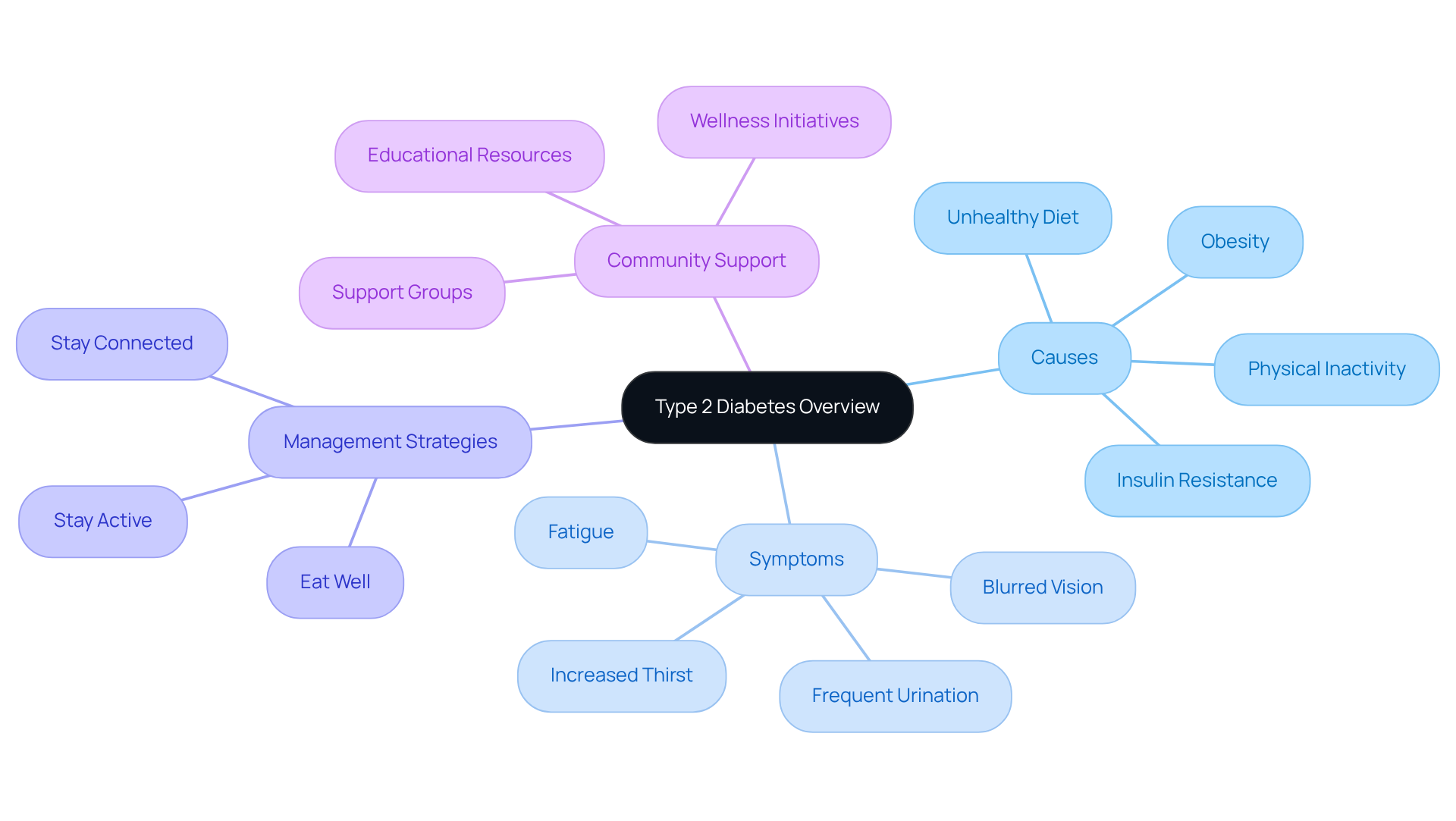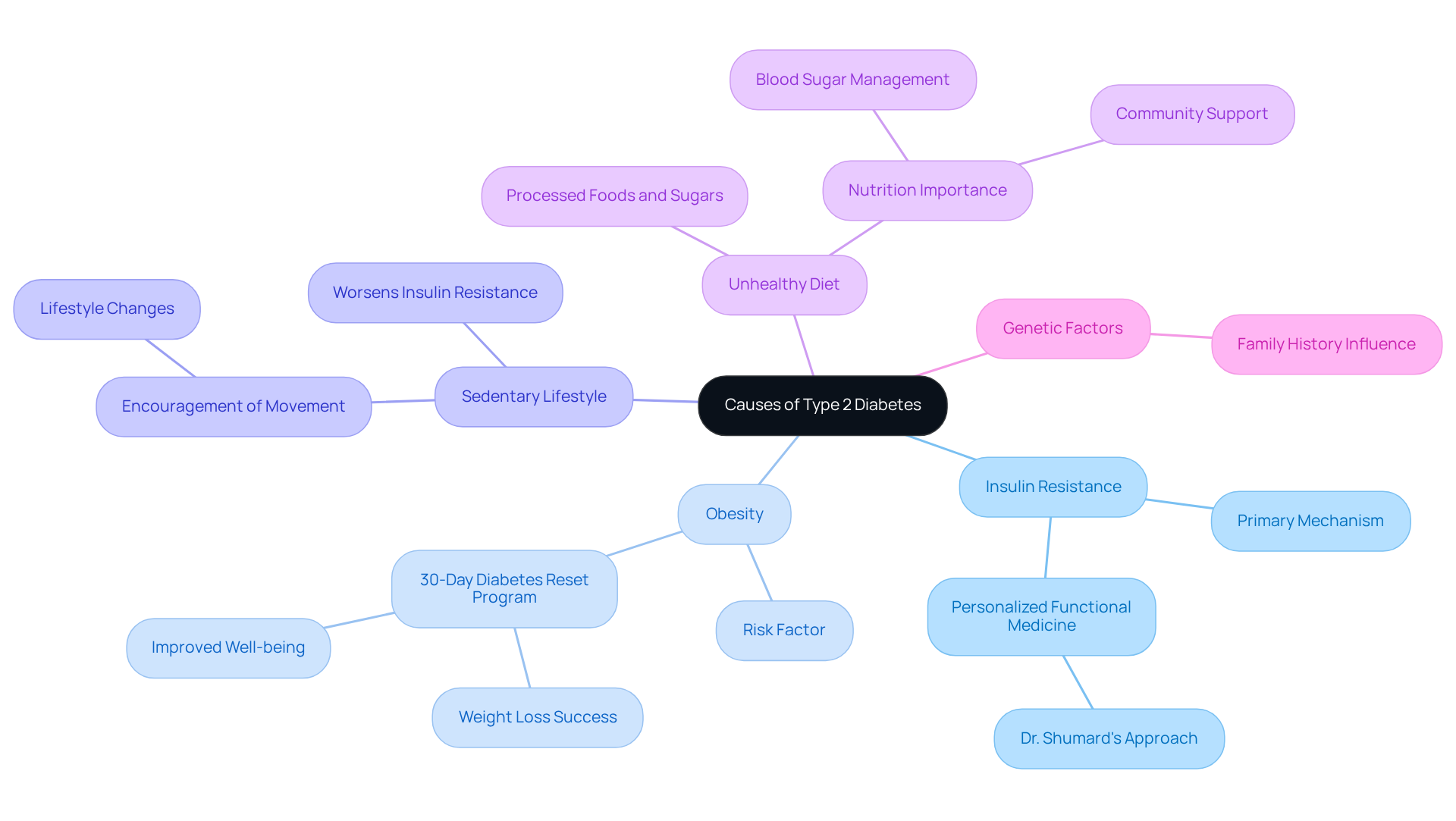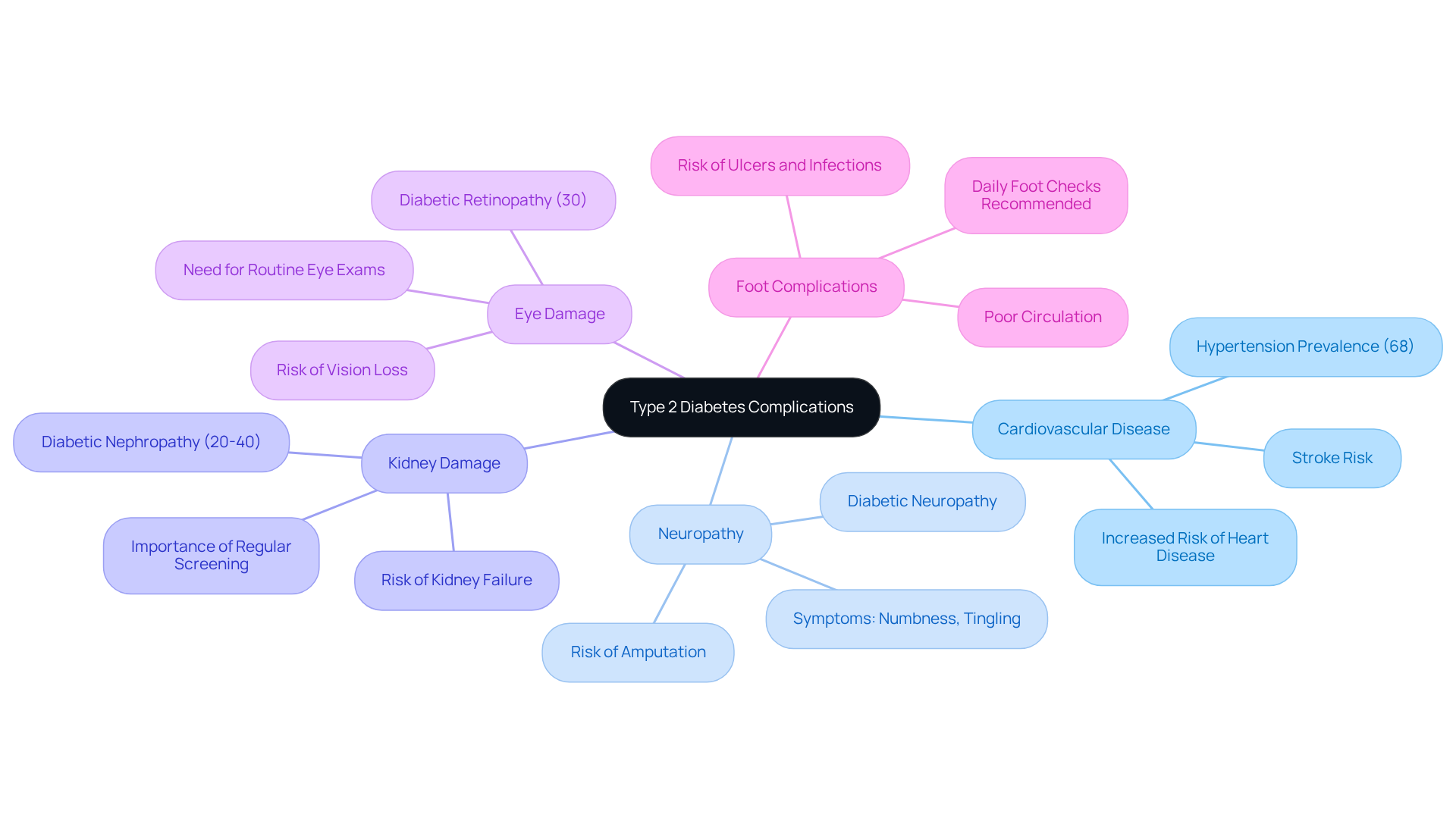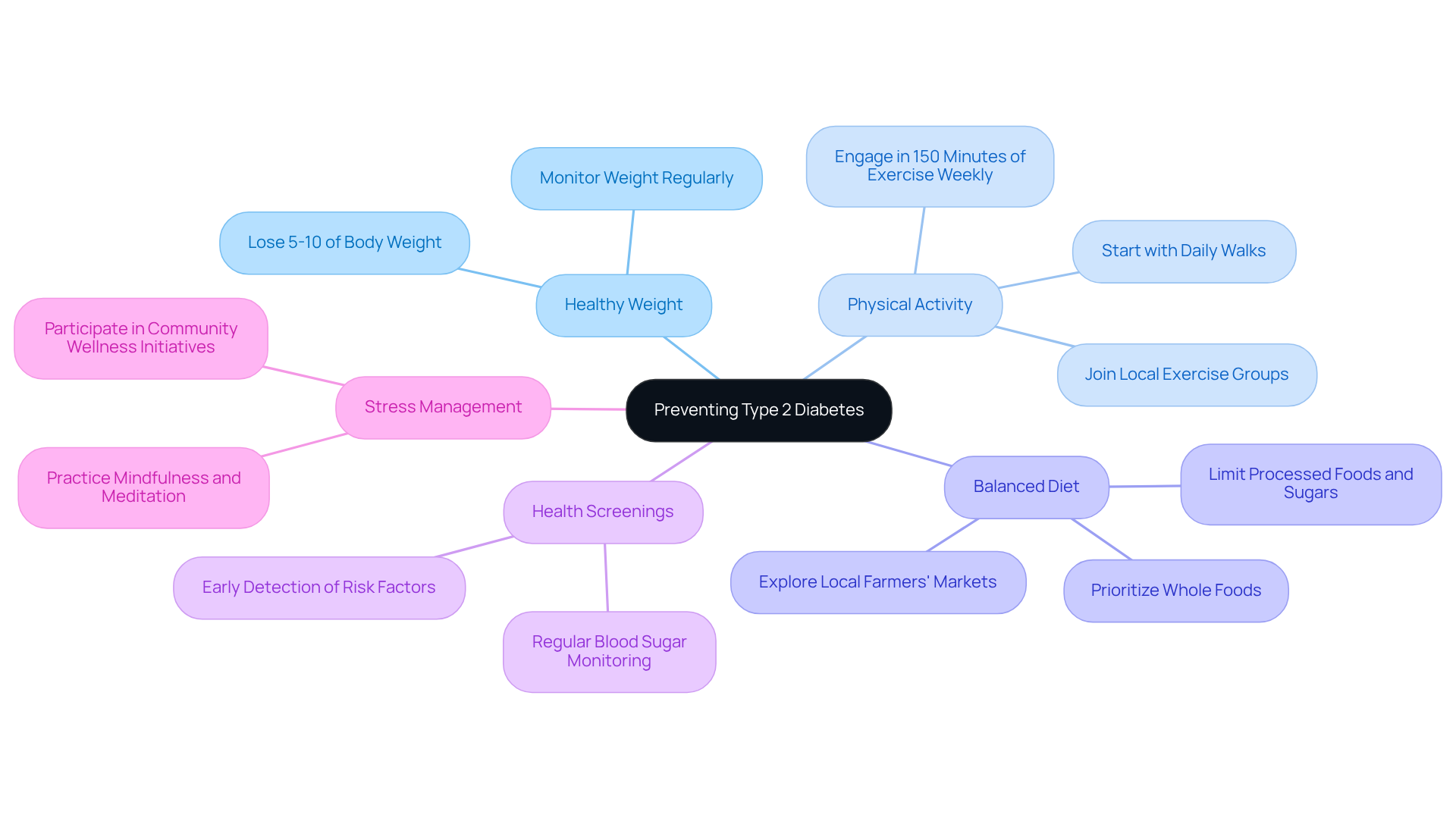Overview
Managing Type 2 diabetes can feel overwhelming, and it’s important to recognize that many factors contribute to its development. Insulin resistance, obesity, sedentary lifestyles, unhealthy diets, and genetic factors can all impair the body’s ability to regulate blood sugar levels. However, there is hope. By making lifestyle changes, such as improving your diet and incorporating regular exercise, you can significantly reduce your risk of developing this condition and its associated health complications.
Imagine feeling more in control of your health and well-being. Many patients find that small, consistent changes lead to big improvements. It’s not just about avoiding diabetes; it’s about enhancing your overall quality of life. You deserve to feel vibrant and healthy.
Taking action can be empowering. Consider joining the 30-Day Diabetes Reset program, where you’ll receive supportive guidance tailored to your needs. Remember, every step you take towards a healthier lifestyle is a step towards a brighter future. You’re not alone in this journey; we’re here to support you every step of the way.
Introduction
Type 2 diabetes is a growing health concern that affects millions of individuals, yet many remain unaware of its complex origins and implications. It’s important to recognize that this condition, primarily characterized by insulin resistance, is often linked to lifestyle choices and environmental factors. Understanding its etiology is crucial for effective management and prevention.
What strategies can you adopt to mitigate your risk and navigate the challenges posed by this prevalent disease? Exploring the multifaceted causes and potential solutions can empower you to take control of your health and improve your quality of life.
Understanding Type 2 Diabetes: An Overview
Type 2 diabetes is a long-term condition that many individuals face, primarily defined by resistance to insulin—a vital hormone that helps regulate blood sugar levels. As the body’s cells become less responsive, blood sugar levels can rise. Unlike type 1 diabetes, which occurs when the body cannot produce insulin, type 2 often develops slowly and is closely linked to lifestyle factors such as obesity, lack of physical activity, and unhealthy eating habits. This condition is the most common form of diabetes, affecting approximately 90% to 95% of the 38 million Americans diagnosed with it. If left unmanaged, it can lead to serious health complications, including cardiovascular disease, kidney failure, and vision loss.
It’s important to recognize that symptoms often appear gradually. They may include increased thirst, frequent urination, fatigue, and blurred vision. Acknowledging these signs is crucial, as early intervention can significantly alter the disease’s trajectory. Many individuals find that making lifestyle changes—like weight reduction, regular exercise, and a nutritious diet—can prevent or even reverse Type 2 diabetes in many cases. For instance, those who engage in physical activity at least three times a week often see a marked reduction in their risk of developing this condition.
In San Marcos, CA, adopting a holistic lifestyle can further enhance the management of blood sugar levels. Participating in outdoor activities, such as hiking or enjoying a stroll in nearby parks, not only promotes physical fitness but also improves glucose sensitivity and boosts mood. Incorporating fresh, local produce from farmers’ markets, like avocados and berries, into your diet can provide essential nutrients and fiber, which are vital for blood sugar regulation. Community wellness initiatives offer valuable support and resources designed for managing blood sugar levels, fostering a sense of connection and motivation among participants.
The significance of addressing insulin resistance cannot be overstated, as it plays a crucial role in the etiology of diabetes type 2. Studies show that improving insulin sensitivity through lifestyle changes can lead to better blood sugar control and overall health. Dr. Shumard emphasizes the importance of education in managing diabetes-related challenges, offering resources such as books and seminars to empower patients. Furthermore, during heat waves, it’s essential to stay hydrated, monitor blood sugar levels frequently, and adjust medications as necessary to ensure safety and effective management. With the rising occurrence of Type 2 glucose intolerance, especially among younger individuals, understanding the etiology of diabetes type 2 and its consequences is vital for successful management and prevention strategies.
Here are some key tips to consider:
- Stay active: Aim for at least 150 minutes of moderate exercise each week.
- Eat well: Focus on a balanced diet rich in fruits, vegetables, whole grains, and lean proteins.
- Stay connected: Join community programs that support healthy living and provide encouragement.
Remember, you are not alone in this journey. Many have walked this path and found success through small, consistent changes. Let’s take this step together toward a healthier future!
Exploring the Causes of Type 2 Diabetes
The reasons behind the etiology of diabetes type 2 can be quite complex, often stemming from a blend of genetic factors and environmental influences. It’s important to recognize that several key contributors play a significant role in this journey:
-
Insulin Resistance: This is the primary mechanism behind type 2 diabetes, where cells in the muscles, fat, and liver struggle to respond effectively to insulin. Many patients find that Dr. Jason Shumard’s integrative approach, which focuses on reversing this resistance through personalized functional medicine strategies, offers safe and effective solutions for chronic illnesses.
-
Obesity: Excess body fat, particularly around the abdomen, poses a major risk factor, as it can lead to difficulties in glucose regulation. Dr. Shumard’s 30-Day Diabetes Reset program has helped numerous patients achieve weight loss and improve their overall well-being, fostering a sense of accomplishment and hope.
-
Sedentary Lifestyle: A lack of physical activity can worsen insulin resistance and contribute to weight gain. Participating in lifestyle changes is a key element of Dr. Shumard’s holistic wellness approach, encouraging patients to embrace movement as part of their healing journey.
-
Unhealthy Diet: Diets rich in processed foods, sugars, and unhealthy fats can lead to obesity and metabolic dysfunction. Dr. Shumard emphasizes the importance of nutrition in managing blood sugar levels, providing valuable resources and community support to assist patients in making healthier choices.
-
Genetic Factors: Family history can influence susceptibility to the disease, reminding us that we are not alone in this battle.
Understanding the etiology of diabetes type 2 is vital for developing effective prevention and management strategies, which is a cornerstone of the care provided at Integrative Wellness Center. By addressing these fundamental issues, Dr. Shumard empowers patients to take charge of their well-being and discover genuine solutions for managing condition 2. Together, we can navigate this path toward a healthier and more fulfilling life.
Implications of Type 2 Diabetes: Health Risks and Complications
Type 2 diabetes mellitus can lead to a range of serious health issues if not managed properly. It’s important to recognize that these complications can significantly impact your quality of life. Here are some key concerns:
-
Cardiovascular Disease: Individuals with type 2 diabetes face a significantly increased risk of heart disease and stroke, primarily due to damage to blood vessels. Research shows that cardiovascular disease is the primary cause of death among individuals with high blood sugar, with nearly 68% of adults with this condition also experiencing hypertension, further increasing this risk.
-
Neuropathy: Diabetes can cause nerve damage, particularly in the feet, leading to conditions such as diabetic neuropathy. This can result in numbness, tingling, and increased susceptibility to infections, which may ultimately necessitate amputations in severe cases.
-
Kidney Damage: Diabetic nephropathy impacts around 20-40% of people with the condition, potentially resulting in kidney failure. Regular screening for kidney function is crucial, as early intervention can significantly reduce the risk of progression to end-stage renal disease.
-
Eye Damage: Conditions such as diabetic retinopathy can lead to vision loss or blindness, affecting up to 30% of individuals with diabetes. Routine eye examinations are essential for early detection and management of these complications.
-
Foot Complications: Poor circulation and nerve damage can lead to serious foot problems, including ulcers and infections. Daily foot checks are recommended to identify any changes early, as minor issues can escalate quickly.
Recognizing these risks underscores the critical importance of early diagnosis and consistent management of blood sugar levels. Many patients find that transformative experiences with Dr. Jason Shumard’s 30-Day Diabetes Reset program can make a significant difference. For instance, one individual reported a remarkable weight loss of 55 lbs and a reduction in A1C from 9.1 to 5.7. Another patient noted a decrease in fasting glucose from 133 to 85, while their regular MD has cut their blood pressure medications in half. These outcomes showcase the effectiveness of a holistic approach.
By adopting a proactive approach to health, you can significantly mitigate these risks and improve your overall quality of life. Remember, you are not alone in this journey, and there are resources available to support you every step of the way.
Preventing Type 2 Diabetes: Strategies for Risk Reduction
A proactive approach centered on lifestyle choices is essential for preventing the etiology of diabetes type 2 conditions. It’s important to recognize that making small changes can lead to significant improvements in your health. Here are some key strategies to consider:
- Maintaining a Healthy Weight: Even modest weight loss can greatly reduce your risk of developing diabetes. Many find that losing just 5-10% of their body weight leads to meaningful improvements in glucose sensitivity and overall metabolic health, which can help in understanding the etiology of diabetes type 2.
- Regular Physical Activity: Engaging in at least 150 minutes of moderate exercise each week is crucial for enhancing insulin sensitivity and overall well-being. Many patients find that starting with a daily walk of just 10-15 minutes, and gradually increasing the time, can make a big difference. Activities like walking, cycling, or swimming have been shown to effectively lower the risk related to the etiology of diabetes type 2. Consider joining a local hiking group or finding a walking partner to boost your motivation and enjoyment.
- Balanced Diet: Prioritize whole foods—fruits, vegetables, whole grains, and lean proteins—while limiting processed foods and added sugars. A balanced diet not only supports weight management but also plays a vital role in the etiology of diabetes type 2 by helping to control blood sugar levels. If you’re in San Marcos, CA, explore local farmers’ markets for a rich variety of fresh produce. Including seasonal fruits and vegetables, like avocados and berries, can help regulate blood sugar and promote overall health.
- Regular health screenings are essential for monitoring blood sugar levels, particularly for individuals with risk factors such as obesity or a family history related to the etiology of diabetes type 2. Early detection can lead to timely and effective interventions.
- Stress Management: Applying stress-reduction techniques such as mindfulness, yoga, or meditation can have a positive impact on blood sugar levels, as chronic stress is known to negatively affect metabolic health. Participating in community wellness initiatives can provide valuable support for managing blood sugar levels, offering tailored guidance and a sense of community.
By embracing these strategies, you can empower yourself to take control of your health and significantly reduce your risk concerning the etiology of diabetes type 2. Remember, every small step counts on this journey toward better health.
Conclusion
Understanding the intricate etiology of type 2 diabetes is crucial for effective prevention and management. This condition, primarily characterized by insulin resistance, is deeply intertwined with lifestyle choices, genetic predispositions, and environmental factors. It’s important to recognize that by acknowledging the complexities behind type 2 diabetes, individuals can take proactive steps to mitigate their risk and enhance their overall health.
Many patients find that several pivotal factors contribute to type 2 diabetes, including:
- Obesity
- Sedentary behavior
- Unhealthy dietary habits
The importance of early detection and intervention cannot be overstated. Lifestyle modifications such as regular exercise, balanced nutrition, and community support are vital strategies for managing blood sugar levels. Furthermore, the significant implications of unmanaged diabetes, including cardiovascular disease and neuropathy, underscore the necessity of understanding and addressing this condition comprehensively.
In light of the rising prevalence of type 2 diabetes, a collective commitment to healthier living is essential. By embracing small, sustainable changes—such as engaging in physical activity, maintaining a nutritious diet, and participating in community wellness initiatives—individuals can significantly reduce their risk and improve their quality of life. The journey toward better health is not one to be undertaken alone; support and resources are available to guide and motivate those seeking to navigate the challenges of type 2 diabetes.
Frequently Asked Questions
What is Type 2 diabetes?
Type 2 diabetes is a long-term condition characterized by insulin resistance, where the body’s cells become less responsive to insulin, leading to elevated blood sugar levels.
How does Type 2 diabetes differ from Type 1 diabetes?
Unlike Type 1 diabetes, which occurs when the body cannot produce insulin, Type 2 diabetes typically develops slowly and is often linked to lifestyle factors such as obesity, lack of physical activity, and unhealthy eating habits.
How common is Type 2 diabetes in the United States?
Type 2 diabetes is the most common form of diabetes, affecting approximately 90% to 95% of the 38 million Americans diagnosed with it.
What are the potential complications of unmanaged Type 2 diabetes?
If left unmanaged, Type 2 diabetes can lead to serious health complications, including cardiovascular disease, kidney failure, and vision loss.
What are some common symptoms of Type 2 diabetes?
Common symptoms include increased thirst, frequent urination, fatigue, and blurred vision. These symptoms often appear gradually.
How can lifestyle changes impact Type 2 diabetes?
Making lifestyle changes such as weight reduction, regular exercise, and a nutritious diet can prevent or even reverse Type 2 diabetes. Engaging in physical activity at least three times a week can significantly reduce the risk of developing the condition.
What role does community wellness play in managing Type 2 diabetes?
Community wellness initiatives offer support and resources for managing blood sugar levels, fostering a sense of connection and motivation among participants.
Why is it important to address insulin resistance in Type 2 diabetes?
Addressing insulin resistance is crucial as it plays a significant role in the development of Type 2 diabetes. Improving insulin sensitivity through lifestyle changes can lead to better blood sugar control and overall health.
What tips are recommended for managing Type 2 diabetes?
Recommended tips include staying active with at least 150 minutes of moderate exercise each week, eating a balanced diet rich in fruits, vegetables, whole grains, and lean proteins, and joining community programs that support healthy living.
What should individuals do during heat waves to manage their diabetes?
During heat waves, it is essential to stay hydrated, monitor blood sugar levels frequently, and adjust medications as necessary to ensure safety and effective management.



